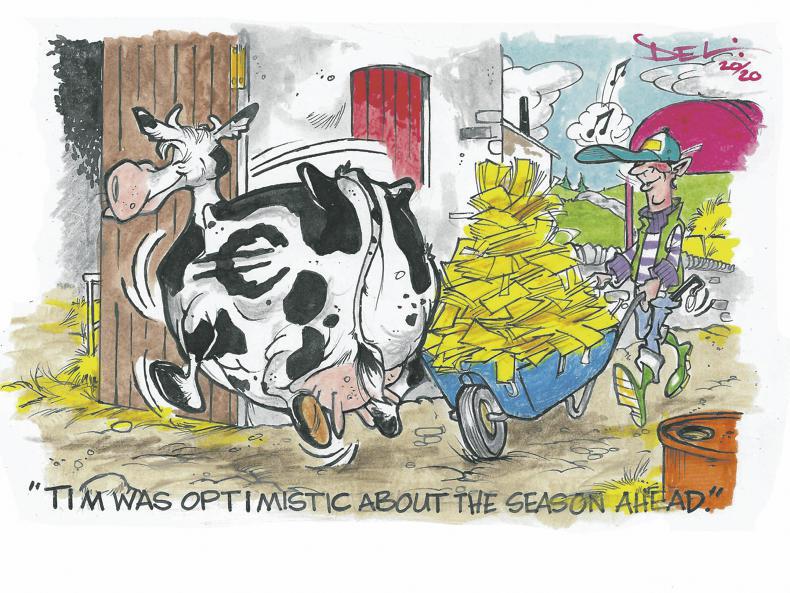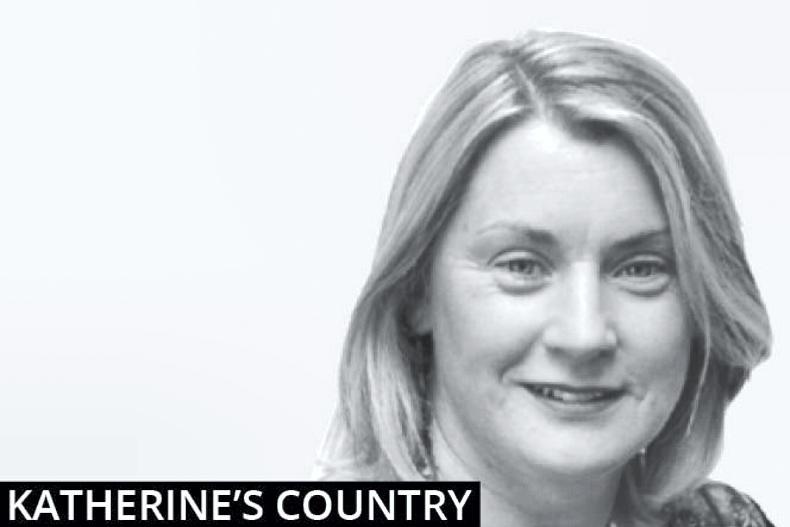I’m assuming that this is my last week when I can make choices. I can decide to sit and cuddle my grandson, Ricky, or continue the preparation for calving in the yard. You can imagine which option wins.
Ricky is now six weeks old and that first smile should shortly light his face. Already he can lock into solid eye contact.
His hands are punching about and he has become the centre of our household. He’s also reaching his weight targets so Julie can relax knowing that she has mothering in hand.

Cartoon by Clyde Delaney.
She is availing of any rest time I can afford her. She’s aware that I will be less available to her as calving progresses. That’s a seasonal pattern that she has been accustomed to all her life.
David of course has been fully involved with his son, but he too must return to his work. Julie has used the time to work out her strategies to care for Ricky. It suffices to say that she is amazing.
Men forget that we are not as strong as them. I’m still educating my gang
It also proves that, despite physical limitations, most difficulties can be overcome with careful planning and a bit of ingenuity.
Women working on farms will identify with physical limitation while carrying out farming duties. Men forget that we are not as strong as them. I’m still educating my gang.
They hang a big heavy gate and next thing it sags a bit meaning the operator has to lift it to latch it.
Or if they close it tightly and I can’t open it. There’s no point in grinning it and bearing it. They actually won’t notice unless it’s pointed out.
First calf born
Down on the farm, the first heifer calved. She had a lovely red and white Jersey-cross heifer. The little calf arrived two weeks early, as often happens with first calvers. She thriving well in a clean, disease-free shed.
My son Philip was immediately on the WhatsApp “Calf Care Group” from Kosovo asking the questions and delivering the reminders: “Has the shed been limed?”, “Has the acidifier been delivered?”, “Are ye ready?”
The replies might have contained a white lie or two.
Planning the labour element during the busy periods on farms is not simple and it was one of our key concerns
He will be back on the farm the first week of February. He will have a month off after serving overseas. The timing couldn’t be better.
Planning the labour element during the busy periods on farms is not simple and it was one of our key concerns.
Family farming is hugely rewarding but when sons and daughters grow up and move away, there can be a huge hole in the labour available.
The chance of an evening or morning off is also invaluable
Every farmer knows the value of that second person around to stand in a gap or assist with bringing in a first time heifer to the milking parlour. The chance of an evening or morning off is also invaluable.
We’ve planned the labour input for the spring. Philip, his fiancée Aileen and I are the chief calf rearers at home. Tim and Diarmuid will be milking as usual. We find that dedicated roles work much better.
Disinfection points at every pen are critical to guard against the spread of infection
Milkers going into the calf shed is not advisable from a disease-spread point of view. It is obviously difficult to avoid if you are a one-person operation or the calf rearers are gone to work.
Disinfection points at every pen are critical to guard against the spread of infection. We use the empty rectangular dry cow tube buckets for this purpose.
Colm has employed a girl, Thea, from New Zealand for the leased farm. If everyone remains healthy, the operation should run smoothly. Labour continues to be a problem on dairy farms.
Calf rearing is not rocket science
When considering calf-rearing duties, you could approach local people who may have school-going children and may like a part-time job.
Calf rearing is not rocket science. Put a good written plan in place with good equipment and allocate a bit of time for training. Transition students are also a valuable resource.
Hazards
It’s an opportune time to look around and see what might be a health and safety hazard in the farmyard.
The farmer in the yard everyday might not have noticed.
Meanwhile; the clean feeders are out in the air in front of the dairy so that both frost and sunlight might kill any remaining germs after washing. Everything helps and the clock ticks.
I’m assuming that this is my last week when I can make choices. I can decide to sit and cuddle my grandson, Ricky, or continue the preparation for calving in the yard. You can imagine which option wins.
Ricky is now six weeks old and that first smile should shortly light his face. Already he can lock into solid eye contact.
His hands are punching about and he has become the centre of our household. He’s also reaching his weight targets so Julie can relax knowing that she has mothering in hand.

Cartoon by Clyde Delaney.
She is availing of any rest time I can afford her. She’s aware that I will be less available to her as calving progresses. That’s a seasonal pattern that she has been accustomed to all her life.
David of course has been fully involved with his son, but he too must return to his work. Julie has used the time to work out her strategies to care for Ricky. It suffices to say that she is amazing.
Men forget that we are not as strong as them. I’m still educating my gang
It also proves that, despite physical limitations, most difficulties can be overcome with careful planning and a bit of ingenuity.
Women working on farms will identify with physical limitation while carrying out farming duties. Men forget that we are not as strong as them. I’m still educating my gang.
They hang a big heavy gate and next thing it sags a bit meaning the operator has to lift it to latch it.
Or if they close it tightly and I can’t open it. There’s no point in grinning it and bearing it. They actually won’t notice unless it’s pointed out.
First calf born
Down on the farm, the first heifer calved. She had a lovely red and white Jersey-cross heifer. The little calf arrived two weeks early, as often happens with first calvers. She thriving well in a clean, disease-free shed.
My son Philip was immediately on the WhatsApp “Calf Care Group” from Kosovo asking the questions and delivering the reminders: “Has the shed been limed?”, “Has the acidifier been delivered?”, “Are ye ready?”
The replies might have contained a white lie or two.
Planning the labour element during the busy periods on farms is not simple and it was one of our key concerns
He will be back on the farm the first week of February. He will have a month off after serving overseas. The timing couldn’t be better.
Planning the labour element during the busy periods on farms is not simple and it was one of our key concerns.
Family farming is hugely rewarding but when sons and daughters grow up and move away, there can be a huge hole in the labour available.
The chance of an evening or morning off is also invaluable
Every farmer knows the value of that second person around to stand in a gap or assist with bringing in a first time heifer to the milking parlour. The chance of an evening or morning off is also invaluable.
We’ve planned the labour input for the spring. Philip, his fiancée Aileen and I are the chief calf rearers at home. Tim and Diarmuid will be milking as usual. We find that dedicated roles work much better.
Disinfection points at every pen are critical to guard against the spread of infection
Milkers going into the calf shed is not advisable from a disease-spread point of view. It is obviously difficult to avoid if you are a one-person operation or the calf rearers are gone to work.
Disinfection points at every pen are critical to guard against the spread of infection. We use the empty rectangular dry cow tube buckets for this purpose.
Colm has employed a girl, Thea, from New Zealand for the leased farm. If everyone remains healthy, the operation should run smoothly. Labour continues to be a problem on dairy farms.
Calf rearing is not rocket science
When considering calf-rearing duties, you could approach local people who may have school-going children and may like a part-time job.
Calf rearing is not rocket science. Put a good written plan in place with good equipment and allocate a bit of time for training. Transition students are also a valuable resource.
Hazards
It’s an opportune time to look around and see what might be a health and safety hazard in the farmyard.
The farmer in the yard everyday might not have noticed.
Meanwhile; the clean feeders are out in the air in front of the dairy so that both frost and sunlight might kill any remaining germs after washing. Everything helps and the clock ticks.






SHARING OPTIONS